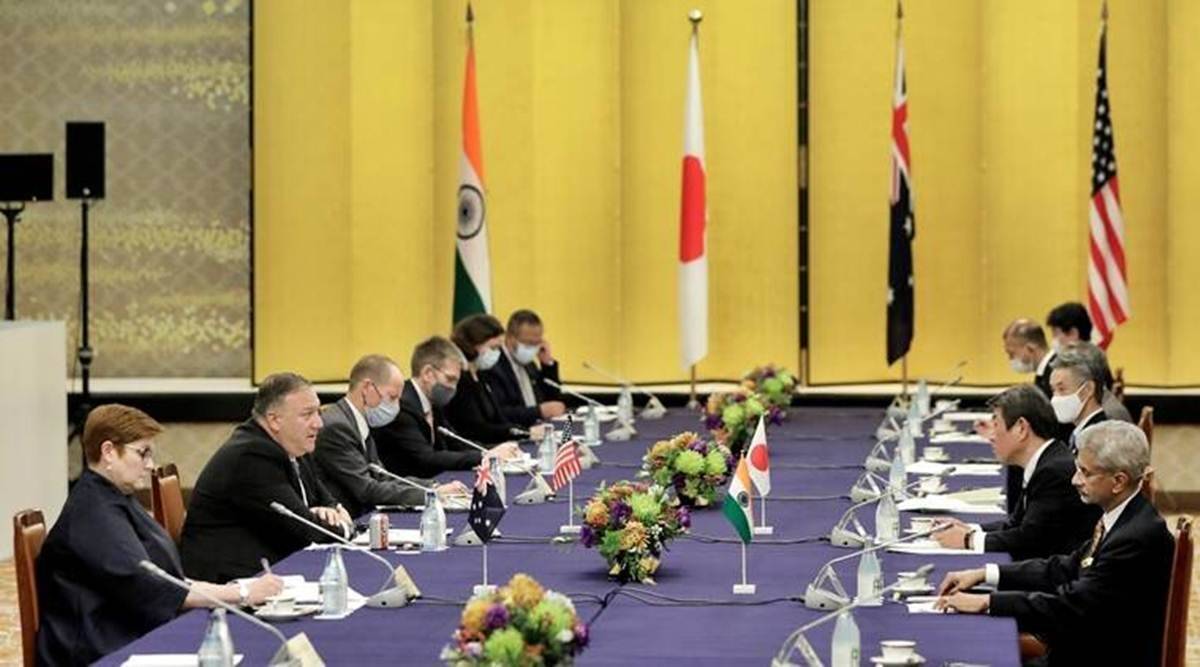

First Summit of 'Quadrilateral Security Dialogue'
Why In News?
US President Joe Biden, Prime Minister Narendra Modi, Australian Prime Minister Scott Morrison and Japanese Prime Minister Yoshihide Suga attended the 'Quad summit, which is the first summit (virtual) of the Quad leaders.
What is the Quadrilateral Security Dialogue or Quad?
The genesis of the Quad is a “core group” that was formed by the four countries in 2004 to coordinate their response to the Indian Ocean tsunami after India emerged as the first responder.
The idea was first mooted by Japanese Prime Minister Shinzo Abe in 2007. However, the idea couldn’t move ahead with Australia pulling out of it.
With the emergence of the Indo-Pacific as a key strategic region and a growing convergence between the four countries on key challenges in the region, the Quad was revived as a loose grouping in 2017 at the level of senior officials.
As India’s comfort levels grew and all four countries faced challenges from an increasingly assertive China, the Quad was upgraded to the level of foreign ministers in September 2019.
What’s different about the Quad Summit?
The Quad has never even issued a joint statement after any of its meetings, reflecting the slightly ambiguous nature of the grouping. So, for the leaders of the four countries to come together for a summit less than two months after US President Joe Biden assumed office is a big deal.
What’s on the agenda for the Quad Summit?
The Quad leaders, in addition to discussing regional and global issues of shared interest and practical cooperation to ensure a free, open and inclusive Indo-Pacific, will exchange views on post-Covid-19 recovery, resilient supply and production chains, cooperation on emerging and critical technologies, maritime security, and climate change.
All Quad members have difference with Chinna:
All members of the Quad are currently dealing with challenges emanating from China.
India has been locked in a military standoff with China in Ladakh sector of the Line of Actual Control since May last year.
Australia has faced the impact of China’s escalating trade sanctions and has concerns about Chinese influence within the country.
Japan has witnessed countless incursions by Chinese vessels in waters around the Senkaku Islands and has concerns about the Chinese Coast Guard law that authorises the use of force.
The US administration has identified China as its main security and trade challenge both the countries are in a state of trade war since long.
Importance of Quad summit for India
India sees the Quad Summit as an opportunity for evolution because the grouping didn’t traditionally have definite areas of cooperation and restricted itself to discussing principles and shared strategic approaches.
For India, the summit will help build on crucial partnerships to address challenges across the Indo-Pacific, which is home to some of New Delhi’s key partners.
Background:
The 'Quadrilateral Security Dialogue,' representatives for the four-member nations have met periodically since its establishment in 2007.
In November 2017, the four countries gave shape to the long-pending proposal of setting up the Quad to develop a new strategy to keep the critical sea routes in the Indo-Pacific free of any influence.
The four Quad member countries have been resolving to uphold a rules-based international order in the Indo-Pacific amid growing Chinese assertiveness in the region.
India's approach to the Indo-Pacific was enunciated by Prime Minister Narendra Modi in his address at the Shangri-La Dialogue in Singapore in 2018.
Inclusiveness, openness and ASEAN centrality and unity lie at the heart of India's Indo-Pacific vision. The 10-nation Association of Southeast Asian Nations (ASEAN) is a key stakeholder in the Indo-Pacific region.
The strategic significance of the Indo-Pacific was also acknowledged by the US in 2018 when it renamed the US Pacific Command (PACOM) as INDO-PACOM.
